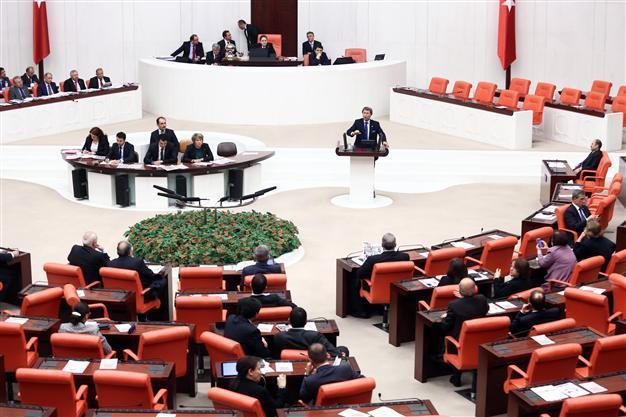Turkish Parliament approves Internet bill despite concerns
ISTANBUL

Parliament has adopted a controversial Internet bill, which has been denounced by the opposition and a number of NGOs as further undermining freedoms. DHA photo
Turkey’s Parliament has passed Feb. 6 a much-debated omnibus bill that includes controversial arrangements concerning the protection of online privacy, amid concerns raised by the European Union as well as local NGOs and opposition parties.
The Turkish Journalists’ Association (TGC) has called on President Abdullah Gül to veto the bill, saying it violated a number of rights, including freedom of speech and freedom of the press.
“This regulation constitutes intervention into many rights, particularly freedom of speech and freedom of the press, and there are points which are in conflict with the Constitution. We are calling on the president to return this regulation to the Parliament,” the TGC’s executive board said in a statement on Feb. 6.
“The regulation that has been approved by the General Assembly is giving unseen authorities to the TİB [Telecommunications Directorate],” the TGC added, according to Doğan News Agency.
Gül, meanwhile, met with Communications Minister Lütfi Elvan at his residence in Ankara over the controversial bill.
Measures approved by the Parliament would allow the president of the TİB to make decisions on his own initiative to block websites for a privacy violation without seeking permission from a court. The bill will also force Internet providers to keep records on web users’ activities for two years and make them available to authorities on request.
The new Internet law raises “serious concerns” over government control and the public’s access to information, the European Commission said Feb. 6, according to Agence France-Presse.
“This law is raising serious concerns here. The law in its current form introduces several restrictions on freedom of expression,” commission spokesman Peter Stano said. “The Turkish public deserves more information and more transparency, not more restrictions.”
Since Turkey is a candidate for EU membership, the law “needs to be revised in line with European standards,” Stano told a press briefing.
The EU has made clear several times that this and other recent legal changes must meet European norms, said Stano, a spokesman for EU Enlargement Commissioner Stefan Füle, who is leading the talks on Ankara's EU membership.
“These issues are regularly raised and discussed when the commissioner meets his Turkish counterpart,” he said. “We are raising these issues constantly.”
Brussels is “monitoring very closely” how Turkey meets the membership criteria, he added.
Martin Schulz, president of the European Parliament, said on Twitter Feb. 6 that the legislation was a step back in an “already suffocating environment for media freedom.”
Schulz was joined by Enlargement Commissioner Stefan Füle and Swedish Foreign Minister Carl Bildt in criticizing the law.
“Turkey’s Internet law to be adopted raises serious concerns. The public needs more transparency and information, not restrictions,” Füle wrote on his Twitter account Feb. 6 both in English and in Turkish. “Also, the EU must raise our serious concern over the new Turkey Internet law,” Bildt wrote via Twitter.
The Turkish opposition also voiced criticism against the law. Nationalist Movement Party deputy leader Celal Adan defined the new law as “nothing more than a blacklisting via the Internet,” in a written statement released.
“The regulation is nothing but an ‘Internet blacklisting.’ Freedom of the press and freedom of communication are under pressure. There are attempts to bring freedoms which are indispensable parts of democracy under the control of the state and the government,” said Adan.
Elvan, however, said the new law would not result in any bans or censorship on the Internet, claiming instead that the regulations were needed to protect the confidentiality of private life.
He also said the new regulations would enable the courts to decide to block certain content in relevant websites instead of blocking whole pages.
He also claimed that the current law did not protect privacy as individuals had to wait two days after complaints for the removal of offensive content.
